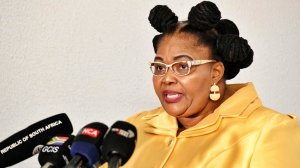While Gauteng battles many self-inflicted water challenges, it will not face a Day Zero, where the taps will run dry, Water and Sanitation Minister Pemmy Majodina assured on Tuesday.
Reflecting on the performance of the Department of Water and Sanitation (DWS) during the first one hundred days under the seventh administration, she explained that, overall, South Africa’s water balance was stable, with localised challenges, including in Gauteng.
South Africa’s most populous province, amid a growing population and growing economy, which is also driving up demand, is experiencing significant water security challenges such as credit management issues, water losses and nonrevenue water, aging infrastructure, illegal connections, illegal mining and servitude encroachment.
“This is a self-inflicted pain by the municipalities of Gauteng, because we warned the municipalities of Gauteng as early as June to take care of their water infrastructure, as they are losing lots of water,” she commented.
The DWS and the Gauteng provincial government have intervened to address the challenges by calling on municipalities to impose water restrictions, currently at level 1, upgrading water infrastructure, strict credit management systems, ensuring proactive governance and exploring alternative water sources.
Majodina highlighted that Gauteng was not in the same position as the City of Cape Town when it experienced its own Day Zero a few years ago, noting that the Western Cape region was in the middle of drought which necessitated extreme measures to limit water consumption.
In Gauteng, there was no drought, but rather, the challenge was water management, where municipalities were not managing their water as expected, she explained.
In line with this, Gauteng’s provincial leaders and municipalities meet on a weekly basis to ensure that the water restrictions are adhered to. Further, municipalities are responding positively in terms of plugging the leaks, disconnecting illegal connections, ensuring correct billing and enforcing the bylaws.
“If those four things can be adhered to by municipalities, then people will be able to get water.”
Majodina noted that while the planned maintenance operation of the Lesotho Highlands Water Project tunnel resulted in a total shutdown of water usually transferred from Lesotho to Gauteng, there was sufficient water storage for the next six to nine months.
Enough water was extracted prior to the shutdown, and within the Integrated Vaal River System several dams have enough water to be transferred to the Vaal dam in the event of low water levels. Further, Rand Water is capped with an extraction limit, in line with its licence.
“We have water,” she assured. However, she cautioned citizens to use water sparingly and adopt water conservation measures in line with the current water restrictions.
In line with this is the establishment of the multistakeholder Platform for a Water-secure Gauteng to improve communication regarding water supply challenges and to raise awareness of the need to use water sparingly.
As part of the work of the platform, a shared information repository and dashboard, accessible to the public, was created on the department’s website, to communicate strategic and timeous information regarding water supply issues in the province.
The platform is currently raising funds which will be used for a major public communications and awareness campaign in the province regarding the need to use water sparingly.
EMAIL THIS ARTICLE SAVE THIS ARTICLE ARTICLE ENQUIRY
To subscribe email subscriptions@creamermedia.co.za or click here
To advertise email advertising@creamermedia.co.za or click here










